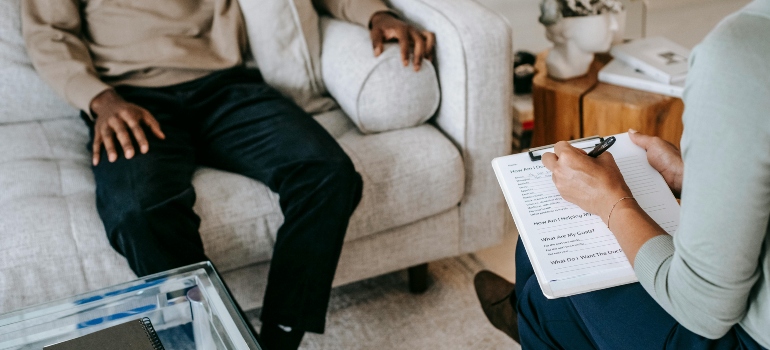Not everyone has the luxury of long-term therapy. Whether it’s due to insurance limits, scheduling conflicts, or financial constraints, many people find themselves with only a handful of sessions. That’s not a failure — it’s a reality. And more importantly, it doesn’t mean change isn’t possible. Even in a short timeframe, therapy can spark meaningful progress. You just have to approach it with intention. In this article, we’ll explore how to make the most of a limited number of therapy sessions through practical tips, mindset shifts, and strategies that work. For those using our mental health services in Massachusetts, these insights can help you maximize each moment in therapy.

Set clear, specific goals from the start
When sessions are limited, clarity becomes your best asset. Knowing what you want to achieve in therapy helps you and your therapist stay focused. With a limited number of therapy sessions, you don’t want to spend too much time figuring out where to start — you want to dive in.
Begin by identifying one or two key areas you want to work on. Ask yourself: What do I want to feel differently about by the end of these sessions? One way to shape your goals is using the SMART approach — making sure they are Specific, Measurable, Achievable, Relevant, and Time-bound.
For example, instead of saying “I want to feel better,” you might aim for “I want to manage my anxiety in work meetings without shutting down.” These kinds of targets give structure to each conversation. Solution focused therapy is a great example of a goal-oriented approach. It emphasizes strengths and achievable steps, making it especially useful when time is tight. If you’re wondering how to make therapy work when sessions are limited, it starts with setting a direction right away.
Come prepared for every session
When you only have a few sessions, every minute matters. Coming in prepared can help you make the most of your time and stay focused on what’s important. Try jotting down your main concerns, thoughts, or emotions before each session. A simple journal entry or bullet list can keep you grounded and ready to dive in.
Tracking your mood or specific symptoms between sessions can also be helpful. It gives your therapist a clearer picture of what’s working and what needs attention. And don’t overlook small wins — mentioning even minor shifts can help build momentum.
Ask yourself: What do I need most from today’s session? This can keep conversations from drifting or getting stuck in surface-level topics. If you’re wondering how to get the most out of limited therapy sessions, preparation is key. It shows up not just in how you arrive, but in what you bring with you emotionally and mentally.
Be honest about what matters most
In short-term therapy, there’s no time to tiptoe around the hard stuff. Being direct about your struggles helps your therapist understand where to focus. Instead of trying to cover every issue at once, prioritize the ones that impact you most.
This doesn’t mean you need to have all the answers. But naming what’s hardest for you right now—whether it’s relationship stress, panic attacks, or trouble sleeping — sets a clear agenda. You don’t have to wait until session three to bring up what really hurts.
If opening up feels uncomfortable, try using simple emotion words or metaphors. Saying “I feel stuck” or “everything feels too loud” can be a powerful starting point.
Being vulnerable early might feel risky, but it allows the work to go deeper, faster. The more honest you are, the more likely it is that even a short series of sessions will lead to meaningful insight and relief.

Use the between-session time wisely
Therapy doesn’t stop when you leave the room. What you do between sessions can be just as important as the sessions themselves. Reflection, journaling, or even trying one small tool you discussed can reinforce the progress you’re making.
You don’t need formal “homework.” Instead, try noticing how your thoughts or behaviors shift after a session. Did you respond to stress differently? Did a coping tool help, even briefly? These observations give your therapist something concrete to work with next time — and help you stay engaged.
Many people find that applying strategies in real life accelerates results. Even just five minutes of quiet reflection can help you process and prepare.
If you’re in the middle of a life transition, finding balance when everything around you shifts can be quite a challenge. But that kind of self-work between sessions can make therapy more impactful, even when it’s brief. So, if you’re looking for tips for getting results from brief therapy, the time between sessions is a powerful tool.
Focus on practical solutions, not just insight
Insight is important, but when time is short, action matters just as much. Therapy doesn’t have to solve every past issue to be effective. Sometimes, the biggest breakthrough is finding one strategy that works and putting it into practice.
Instead of diving deep into every emotional layer, ask: What’s one thing I can do differently this week? Solution-focused techniques often emphasize what’s already working and how to build on it. They help shift the conversation from “Why is this happening?” to “What can I try next?”
That doesn’t mean skipping reflection—it just means pairing it with forward movement. In some cases, working through personal struggles in a client centered group therapy setting can also support this kind of growth. Even in a few sessions, focusing on the present and building skills can help create meaningful change. If you’re thinking about making therapy effective in fewer sessions, prioritize what’s actionable, not just what’s insightful.

Ask about online or flexible options
Sometimes therapy feels limited, not because of the number of sessions, but because of logistics — commuting, time off work, or finding a local provider. If in-person sessions are hard to maintain, virtual options can extend your access to care.
Teletherapy is just as effective for many people, and it allows for greater scheduling flexibility. You can attend sessions from home, during lunch breaks, or even while traveling.
East Point Behavioral Health offers online therapy not just for Massachusetts residents, but also for adults in other states. If you’ve started therapy in person but find it difficult to continue, ask your provider about hybrid or remote options.
Virtual care helps you stay consistent, which is especially important if you are experiencing life transitions. And in short-term therapy, consistency matters. So if you’re working with time constraints, this flexibility could be the key to making progress without interruptions.
Know that progress isn’t always linear, but it can be lasting
Just because you don’t solve everything in a few sessions doesn’t mean therapy isn’t working. Progress in mental health often happens in small, sometimes uneven steps. A single insight can lead to a shift in how you handle stress. One tool can help you break an old pattern.
Even when the work feels slow or messy, you may be making internal changes that take root over time. That’s why it’s important to notice shifts — maybe your reaction to a situation was slightly different, or your self-talk was more compassionate than usual.
Can therapy still be effective with just a few sessions? Yes, especially if you’re intentional and present during the process. Short-term therapy can help you uncover tools, clarify your values, and plant the seeds for ongoing growth.
The benefits often continue long after your last session.

Quality over quantity
You don’t need months of therapy to make meaningful progress. A limited number of therapy sessions can still offer clarity, relief, and momentum — if you approach them with purpose. Being open, present, and goal-oriented makes every minute count. It’s not about covering everything. It’s about uncovering what matters most—and doing something with it. Whether you’re navigating stress, anxiety, or life transitions, therapy can still help, even in a short window. Contact us today to learn how therapy — no matter how brief — can still make a lasting impact.



